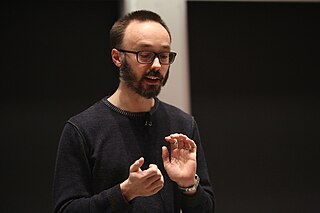Related Research Articles

Bruce Perens is an American computer programmer and advocate in the free software movement. He created The Open Source Definition and published the first formal announcement and manifesto of open source. He co-founded the Open Source Initiative (OSI) with Eric S. Raymond.

Free software, libre software, libreware sometimes known as freedom-respecting software is computer software distributed under terms that allow users to run the software for any purpose as well as to study, change, and distribute it and any adapted versions. Free software is a matter of liberty, not price; all users are legally free to do what they want with their copies of a free software regardless of how much is paid to obtain the program. Computer programs are deemed "free" if they give end-users ultimate control over the software and, subsequently, over their devices.
The free software movement is a social movement with the goal of obtaining and guaranteeing certain freedoms for software users, namely the freedoms to run, study, modify, and share copies of software. Software which meets these requirements, The Four Essential Freedoms of Free Software, is termed free software.

GNU is an extensive collection of free software, which can be used as an operating system or can be used in parts with other operating systems. The use of the completed GNU tools led to the family of operating systems popularly known as Linux. Most of GNU is licensed under the GNU Project's own General Public License (GPL).

Bdale Garbee is an American computer specialist who works with Linux, particularly Debian. He is also an amateur radio hobbyist (KB0G), and a member of AMSAT, Tucson Amateur Packet Radio, and the American Radio Relay League. As of 2023 he is the President of Amateur Radio Digital Communications.

Free and open-source software (FOSS) is software that is available under a license that grants the right to use, modify, and distribute the software, modified or not, to everyone free of charge. The public availability of the source code is, therefore, a necessary but not sufficient condition. FOSS is an inclusive umbrella term for free software and open-source software. FOSS is in contrast to proprietary software, where the software is under restrictive copyright or licensing and the source code is hidden from the users.

The adjective free in English is commonly used in one of two meanings: "at no monetary cost" (gratis) or "with little or no restriction" (libre). This ambiguity can cause issues where the distinction is important, as it often is in dealing with laws concerning the use of information, such as copyright and patents.
GNOME Foundation is a non-profit organization based in Orinda, California, United States, which works to coordinate the efforts in the GNOME project.
Alternative terms for free software, such as open source, FOSS, and FLOSS, have been a controversial issue among free and open-source software users from the late 1990s onwards. These terms share almost identical licence criteria and development practices.
The following outline is provided as an overview of and topical guide to free software and the free software movement:

A free-software license is a notice that grants the recipient of a piece of software extensive rights to modify and redistribute that software. These actions are usually prohibited by copyright law, but the rights-holder of a piece of software can remove these restrictions by accompanying the software with a software license which grants the recipient these rights. Software using such a license is free software as conferred by the copyright holder. Free-software licenses are applied to software in source code and also binary object-code form, as the copyright law recognizes both forms.

Roberto Di Cosmo is an italian computer scientist and director of IRILL, the Innovation and research initiative for free software.

According to the Free Software Foundation Latin America, Linux-libre is a modified version of the Linux kernel that contains no binary blobs, obfuscated code, or code released under proprietary licenses. In the Linux kernel, those types of code are mostly used for proprietary firmware images. While generally redistributable, they do not give the user the freedom to audit, modify, or, consequently, redistribute their modified versions. The GNU Project keeps Linux-libre in synchronization with the mainline Linux kernel.

GLPI is an open source IT Asset Management, issue tracking system and service desk system. This software is written in PHP and distributed as open-source software under the GNU General Public License.

Stefano Zacchiroli is an Italian and French academic and computer scientist who lives and works in Paris, and a former Debian Project Leader.

Open-Sankoré is a free and open-source interactive whiteboard software compatible with any projector and pointing device.

Dolibarr ERP CRM is an open source, free software package for companies of any size, foundations or freelancers. It includes different features for enterprise resource planning (ERP) and customer relationship management (CRM) but also other features for different activities.
Software Heritage is a non-profit organization which provides a service for archiving and referencing historical and contemporary software — with a focus on human readable source code. The site was unveiled in 2016 by Inria and is supported by UNESCO. The project itself is structured as a non‑profit multi‑stakeholder initiative.

Framasoft is an education-oriented social network created in November 2001 by Alexis Kauffmann, Paul Lunetta, and Georges Silva. Since 2014, it has been supported by a nonprofit organization of the same name based in Lyon, France. Mainly focused on free software valorisation, it is divided into three main branches of activity based upon a collaborative model: promotion, dissemination, and development of free software, enrichment of the free culture movement, and online services.
References
- ↑ Confolant, Anne (1 October 2010). "IRILL : le nouvel outil de promotion du logiciel libre en Europe", ITespresso. Retrieved 5 October 2010.
- ↑ Nathan Willis (2 September 2015). "Debsources as a platform". LWN.net.